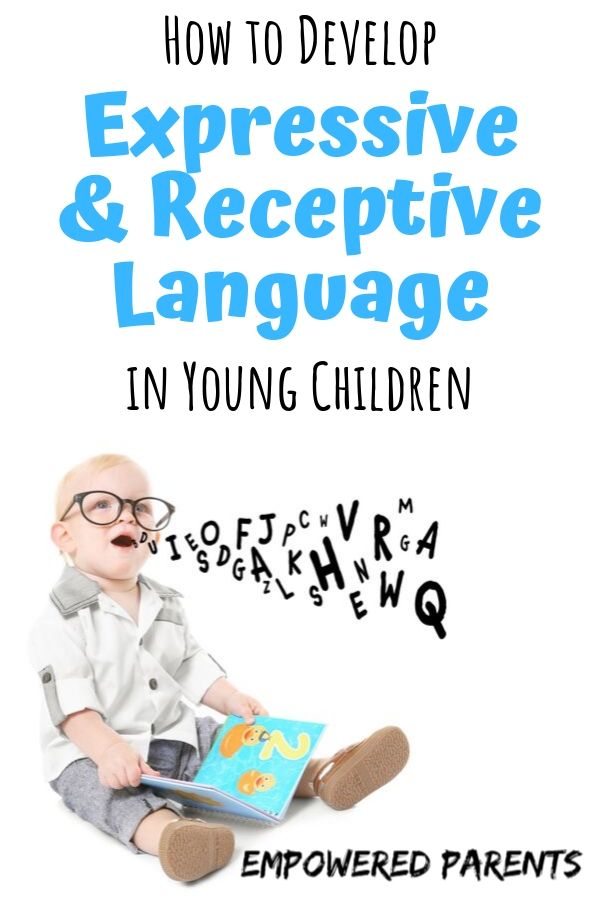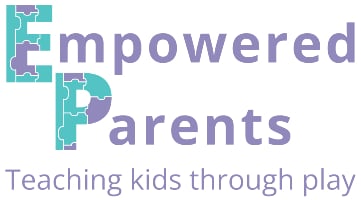Language is a vital part of children’s cognitive development. Every day of their lives, children will communicate with others.
Language is divided into two main areas: expressive and receptive language. Here is a brief overview of what these are, as well as how you can develop these essential language skills in your children.
What is Receptive Language?
Developing receptive language skills involves the ability to understand language and spoken words.
A child learns basic language from their parents and through their everyday routines. They learn to interpret what they hear as a way to understand what is going on in life.
They start learning sounds and words.

Receptive language also involves the process of listening to someone or something. A child picks up information from the environment around them and from what is being said to understand their current situation [source].
Without receptive language, effective communication becomes difficult. Children with receptive language difficulties may struggle to follow multi-step instructions or may not respond appropriately to questions, whether at home or school.
Receptive language difficulties may eventually lead to further issues, including behavioural problems. A child may struggle with various school activities and fail to thrive academically.
What is Expressive Language?
In contrast, expressive language skills refer to spoken and signed language. Children may express themselves with words and gestures.
It involves forming sentences, building vocabulary, and using grammar correctly to communicate with others and describe events and actions.

Children should be able to communicate and explain what they want as well as write it correctly. As the name suggests, it is the art of expressing oneself. Without this, a child can barely communicate [source].
Expressive language is essential because, without it, your child cannot let you know what they are thinking, feeling, or needing.
Children need to be able to communicate all their needs, wants, and ideas. Being able to interact successfully and effectively is essential.
How do Children Develop Language?
Children acquire language in a variety of ways, and it develops gradually over time.
To develop expressive language skills, a child needs to first develop receptive language skills. They also need to have the ability to concentrate without being distracted.
Initially, children develop pre-language skills. They learn to gesture, make facial expressions, imitate people, and make eye contact.
Then, they start to play and develop self-motivation. That motivation includes wanting to engage in conversation with family and friends.
From 8 to 13 months, babies begin to point at objects, shake their heads, wave hello and goodbye, and attempt to speak in their own ‘words’. From then until around 18 months, they gradually build their vocabulary and begin to understand short phrases and words.
At the age of two, they start to use sentences, and these begin to make sense as their grammar improves. Then, up until age five, their language improves drastically.
They understand what is said to them, and their social skills improve too. After the age of five, your child’s communication with others will be more intelligible [source].
Ways to Improve Receptive and Expressive Language
There are several things you can do at home to support your children’s receptive and expressive vocabulary development. Here are a few receptive and expressive language activities and ideas:
- To support their receptive language, ensure you make eye contact with your children when speaking to them.
- When giving instructions, avoid delivering them all at once – break them into manageable chunks.
- You can also use time sequences with your children and ask them to repeat instructions to ensure they have understood what is being said.
- Read lots of books to your children, so they can learn the time sequences. Use examples and demonstrate to your children what you mean. Reading also supports the development of expressive language.

- For both receptive and expressive language, allow your children to play frequently.
- To help your children develop expressive language, speak directly to them so they can see how you articulate the words.
- Whenever you can, try to expand their vocabulary with simple phrases.
- If a child says something that isn’t grammatically correct, model the correct sentence for them.
- Encourage your kids to verbalize their needs instead of relying on their hand gestures.
- Discuss your daily activities with them.
- Music is also an excellent way for them to learn words and phrases. Here are some great songs to teach your kids.
- Here are some interactive language activities.
What Causes a Language Delay?
Often, it is difficult to pinpoint the cause of a child’s language delay. There could be many factors or it could be a symptom of a more significant developmental disorder.
This is why it is essential to consult a professional if you notice significant delays in your child’s language development.
What are the Symptoms of a Language Delay?
Many children with a language delay often experience social or academic difficulties. These types of struggles can often lead to behavioural problems [source].
If your child has a problem with receptive language, they could have some or all of these symptoms:
- Difficulty understanding what others say to them
- Difficulty following spoken directions
- Difficulty organising their thoughts, whether spoken or written
With expressive language delays, your child could exhibit these symptoms:
- Difficulty constructing a sentence
- Frequent use of filler words such as “um”
- A limited vocabulary compared to children of a similar age
- Incorrect use of tenses
What to Do if Your Child Has a Language Delay
If you suspect your child has a delay in either receptive or expressive language development, consult a speech therapist.
They can carry out an assessment to determine the nature of the issue and how best to support your child.
How Can Therapy Help?
Therapy can help your child to develop their language ability further. Therapists are trained to support children with language delays. They can strengthen your child’s language skills, enabling more effective communication with you and their peers [source].

Untreated language delays may lead to difficulties in forming friendships or succeeding at school. In more severe cases, it may indicate a broader developmental disorder.
Pay close attention to your child’s receptive and expressive language, and make time to support their language development each day.
Every child develops at their own pace; however, if you observe multiple developmental concerns, consult a speech therapist.
Learn more about the 17 early literacy skills in childhood.


Anabilie Villanueva
Wednesday 22nd of March 2023
I just found your page today.its very helpful for me.thank you for sharing
Tanja Mcilroy
Tuesday 28th of March 2023
Thanks Anabilie!
Lucinda
Saturday 27th of March 2021
I've only just discovered your page today. Thank you for your well thought out and clear explanations. The information is brilliant. I am a preschool teacher myself (South african too) and I will be directing my parents to click on your download!
Tanja Mcilroy
Wednesday 31st of March 2021
Hi Lucinda, thanks for your kind words. Always great to meet a fellow South African. I hope you'll find lots of useful info. Take care, Tanja